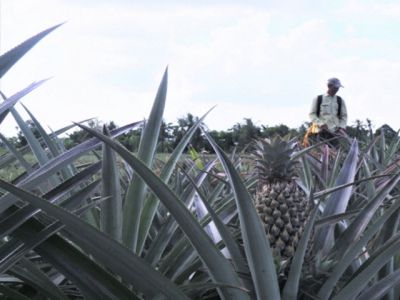Strengthening the role of structural and non-structural measures in the Mekong Delta

Both structural and non-structural measures have played an important role in the comprehensive and sustainable development of the Mekong Delta making it a climate-resilient region.
A pineapple-aquaculture farming model in Hau Giang. Photo: Pham Hieu.
Since the end of 2020, the Department of Agriculture and Rural Development of Hau Giang province has deployed climate -resilient livelihood models when Cai Lon- Cai Be sluice gate has been under construction.
Long My district and Vi Thanh city were chosen for the pilot project of four livelihood models which represented three ecological zones: Salt water, fresh water and brackish water included a 9-hectare soursop farming model; a 20-hectare rice-vegetable farming model; a 10-hectare pineapple-aquaculture farming model and a 12-hectare rice-shrimp farming model.
Vo Tan Phat, a farmer in Luong Tam commune, Long My district, has been selected to carry out the pilot project of growing watermelon in rice land. Through training courses, Phat has been equipped with the knowledge of how to prepare soil for planting, how to take care of plants and how to apply fertilizers and pesticides at proper doses. As a result, Phat could harvest two tons of watermelon per hectare. After all costs have been subtracted he earned around VND20 million/crop.
In addition to the implementation of farming models, the project has invested in irrigation infrastructures such as culverts, sluice gates, water-pumping stations to serve agricultural production.
The construction of the box culvert along Mieu Channel in Luong Nghia commune, Long My district completed on April 20 serving irrigation for approximately 26 hectares of agricultural land. Ngo Van Tam in hamlet 8, Luong Nghia commune excitedly said previously, the winter-spring crop was poor because of uncontrolled irrigation. Since the culvert was brought into use, he has currently felt secure to enter the 2021-2022 winter-spring rice crop.
Along with that, various non-structural activities have been implemented under the project such as developing demonstration models, establishing and strengthening the collection of information, data, organizing propaganda programs and seminars, sharing experiences.
According to Hau Giang Sub-department of Irrigation the project has not only helped control water resources but also has urge farmers to take initiatives in production, especially in the areas often affected by drought and saltwater intrusion.
According to Le Duc Thinh, Director of the Department of Economic Cooperation and Rural Development (under the MARD) the Resolution No.120/NQ-CP of the Government regarded natural development as a comprehensive, effective and sustainable approach for the Mekong Delta to adapt to climate change. Accordingly both structural and non-structural measures are extremely important.
"Both structural and non-structural solutions need to be further boosted. These solutions will promote the value of infrastructures in the Mekong Delta. It's important to effectively use fresh water inside sluice gates, especially in the face of water shortage, finding ways to reduce water overuse in agriculture and improving people's capacity to realize the risks triggered by climate change, saltwater intrusion and soil degradation," said Le Duc Thinh.
In Hau Giang, 73 irrigation infrastructures have been put into operation, increasing the irrigated agricultural land area to 77,000 hectares, accounting for 55% of the province's total arable land. Up to now the province has formed 915 irrigated areas with 30-100 hectares each area, producing rice, fruits, sugarcanes and pineapples. Additionally, more than 70% of the vegetable-growing area has been irrigated.
Related news
 Terrified of antibiotics, farmer turns towards green husbandry
Terrified of antibiotics, farmer turns towards green husbandry Scientific applications and experiences have helped Mr. Nguyen Van Ngu (Song Cong city, Thai Nguyen province) create a biological and sustainable livestock farm
 Notable imprints of rice farmers in the Mekong Delta
Notable imprints of rice farmers in the Mekong Delta Numerous models of advanced rice farming have helped increase the yield and quality of rice while also lowering the cost in the places where the VnSAT
 Rice straws and microbial products - the fertilizer-saving combo
Rice straws and microbial products - the fertilizer-saving combo Processing rice straws with microbial products creates a great source of organic fertilizers which reduces the use of chemical fertilizers and pesticides